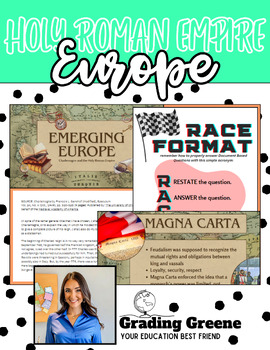Emerging Europe | Feudalism | Charlemagne Unit: Includes DBQ, Google Slides...
- Google Slides™

Products in this Bundle (3)
Bonus
Description
Learn about defining moments in European History starting with the fall of the Roman Empire through the signing of the Magna Carta. This unit takes you through Charlemagne's Empire and the rise of feudalism, displaying an ebb and flow of European social structure. Throughout this presentations, you will review themes of government, religion, social class and societal trends with student review questions embedded for formative assessment.
The Google Slides Presentation also corresponds to a student note packet with fill-in-the-blank notes and unit vocabulary (included as Bonus File)
Further extend your students' understanding the Holy Roman Empire by exploring secondary sources on Charlemagne with corresponding DBQs. This package also includes a student activity to pre-teach proper DBQ format.




